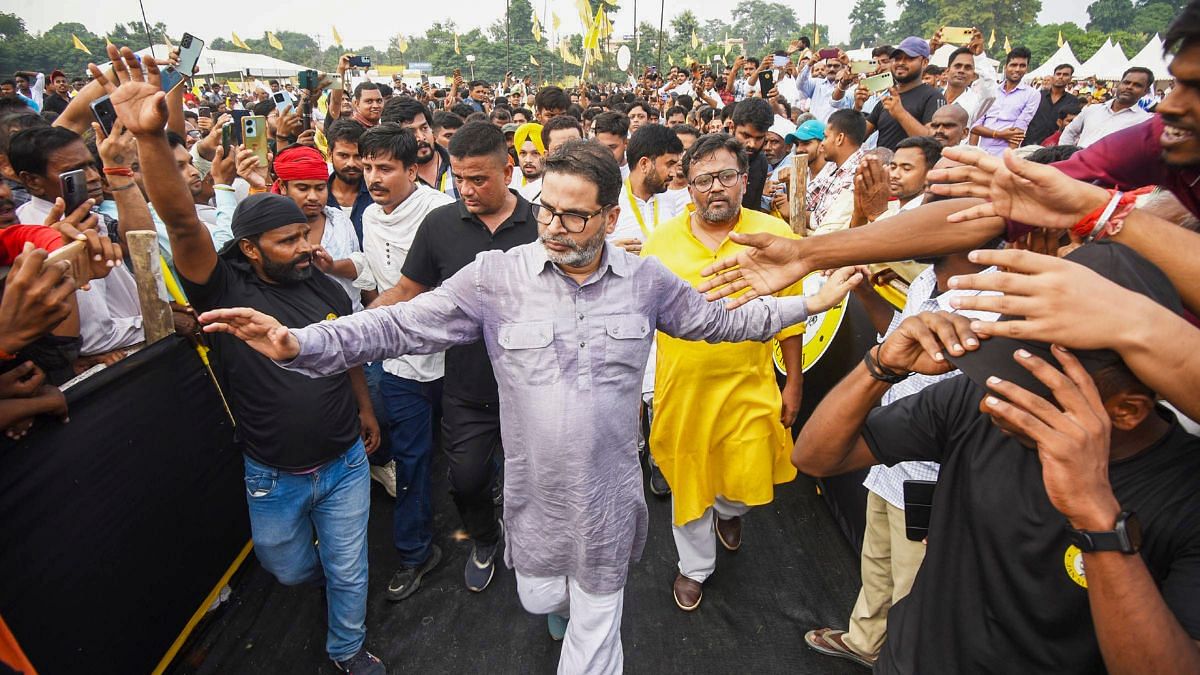Patna: Former political strategist Prashant Kishor announced the birth of his political party—Jan Suraaj—at a well-attended rally at the Veterinary College ground in Patna Wednesday.
He sprung his first surprise, announcing the name of former Indian Foreign Service officer Manoj Bharti as the working president of the new party. Bharti is an IITian, a Dalit and hails from Bihar’s Madhubani district. “He is here not because he is a Dalit. He has been selected because he is even better than Prashant Kishor and happens to be a Dalit,” Kishor said.
Laying out the agenda, Kishor said that the party plans on working towards removing the dry liquor policy and using the losses incurred by Bihar due to the ban—Rs 20,000 crore per year—for better education and creating job avenues for the youth.
He also said that the party would help farmers by extending MGNREGA (Mahatma Gandhi National Rural Employment Guarantee Act) to cultivators, and facilitate loans to women for self employment at 4 percent interest. He also promised pensions of Rs 2000 each for all senior citizens.
With the launch of the Jan Suraaj on Gandhi Jayanti, the key question is which side will be more severely impacted by Prashant Kishor’s entry in Bihar’s political landscape—the Bharatiya Janata Party-Janata Dal (United) alliance, or the Rashtriya Janata Dal and Congress-led Mahagathbandhan.
With the assembly polls due next year, Kishor’s Jan Suraaj may hurt the chances of both alliances, experts say.
“One has to understand the social structure of Bihar and how caste groups have been linked to one alliance or the other. Kishor started his ‘padyatra’ (foot march) two years ago as a corporate manager. But then, he began making political moves,” N.K. Choudhary, former Economics professor at Patna University, told ThePrint.
“In the process, he tried to woo women voters—a key support base for Nitish Kumar, Muslims—core voter base for RJD, and upper castes—again one of the core voter bases of BJP. He has raised issues impacting the weaker sections, particularly the Dalits. I have no doubt that he will leave his footprint in the 2025 assembly polls.”
D.M. Diwakar, former director of A.N. Sinha Institute of Social Studies, explained that Kishor’s party “will certainly make a dent, but it will be candidate-specific”.
“If he fields an upper caste candidate, he will hurt the NDA (National Democratic Alliance). If the candidate is from the Muslim community or other weaker sections, it will hurt the Grand Alliance (Mahagathbandhan) more.”
“In 2020, a Plurals Party came into existence and contested all the seats, and not a single candidate could retain their deposit. But Prashant Kishor is different. He has been on padyatra for the last two years and built the basic infrastructure of the party. He does not appear to be short of funds and he knows how to contest elections,” Diwakar said.
According to Diwakar, Kishor may have a deeper impact in Bihar if he sticks beyond the next year’s elections. “In 2025, he will be introducing himself to Bihar politics.”
‘Jan Suraaj’s impact will be marginal’
Meanwhile, the big political parties are ignoring Kishor. For them, Jan Suraaj is too insignificant.
“There have been others. like the Plurals Party and the Aam Aadmi Party, that tried to make a difference and failed,” said BJP spokesperson Prem Ranjam Patel.
Former BJP MLA Sanjay Singh Tiger remarked that Jan Suraaj’s impact in Bihar will be the same as the NOTA votes.
RJD’s Tejashwi Yadav had previously dubbed Kishor as “BJP’s B-team”. Senior RJD leader Abdul Bari Siddiqui said, “I do not see Muslims and Yadavs leaving my party for Kishor. It can be another platform for potential candidates that fail to secure a ticket from either the Grand Alliance or NDA.”
JD(U) spokesperson Rajiv Ranjan said that the battle of 2025 will be between two main alliances. “The effect of Kishor’s Jan Suraaj will be marginal.”
What is Kishor doing differently
During his Padyatra, Kishor worked to create a solid structure for the political party, recruiting workers and setting up offices right down to the block level. The candidates will not be picked by him, unlike most other parties where the selection is done by the top leadership. Instead, the workers will play an instrumental role in the process.
Additionally, instead of the typical election manifesto released by political parties, Jan Suraaj plans to release a development map for each of the 7,000-odd panchayats in Bihar before the elections.
(Edited by Mannat Chugh)
Also read: Lok Sabha polls showed people cannot tolerate arrogance: Prashant Kishor

